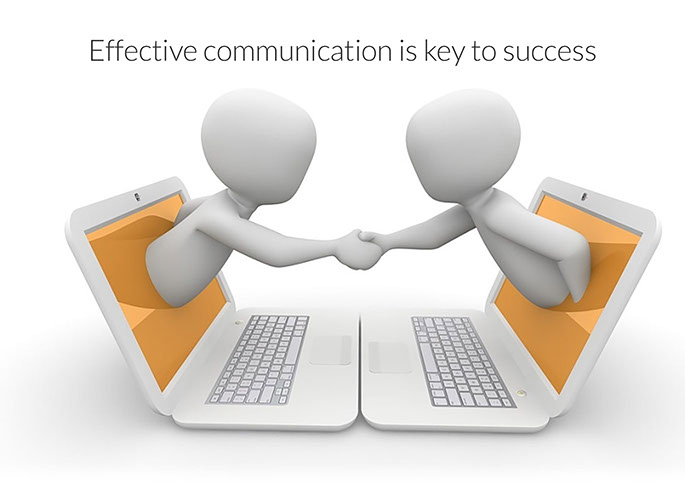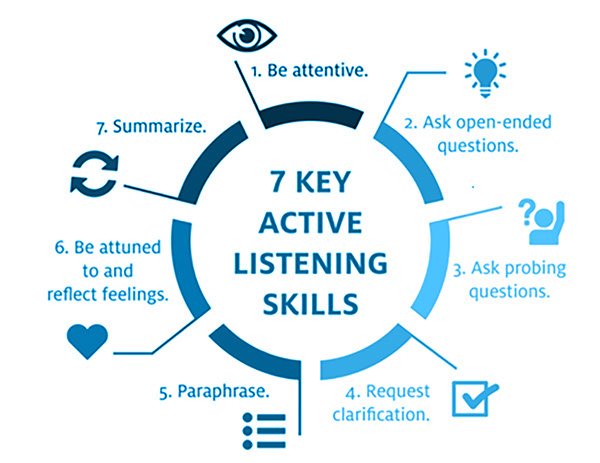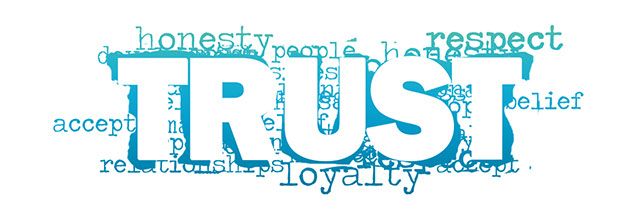Otermans Institute,
in India
Tips on effective Communication
• What is your message, and how do you communicate this?
• When you speak, be clear and summarize
• Be empathic and develop trust
• Benefits of effective communication
• Tips and exercises during 'lockdown'
Do you sometimes feel that you are in a conversation but you are not connecting with the other person? That you are talking to each other but the message you would like to send across does not come? To communicate means to pass on information, news or thoughts. If the sender and receiver understand the same thing, then the communication is successful.
Successful communication is not only very important in business, but also in your personal life. How do you then come to acquire good communication skills? This lesson will provide you with the foundation for effective communication.
If you thought our content was useful and helped you upscale today, you can leave a donation at the below. All funds collected will be donated to the Prime Minister's National Relief Fund to support Covid-19 victims.
DONATE NOW
What is your message, and how do you communicate this?
Determine first what you would like to say and what is the purpose of your message? This is because your message is built on these answers. Why would you like to say this to someone? To whom specifically are you communicating this and where? These questions are also important to address because not only is the content of your message important, but also the way you communicate it. This determines how your message is received. For this you use verbal and non-verbal tools that are selected based on your answers to the above questions. For instance your posture, which is a non-verbal tool, reflects your message: If you are standing with a straight posture and open arms you seem more approachable. Remember when acting with the right non-verbal communication tools, a difficult statement becomes easier to communicate. See our lesson on body language for more tips on this.
Listen and ask questions
If you actively listen to what a person is saying, you have a better understanding of the message. Moreover be alert and interested in the other person by asking questions. This not only keeps the conversation going by making the other person feel like you are actively listening to what they are saying but also encourages them to open up and say more.
For active listening, it best to keep in mind the following:
Be attentive: Show that you are interested in what the other person is saying and keep your attention on the person. For instance, nod your head, say “hmm”or “ok” in intervals. Keeping your head slightly tilted also shows that you are listening.
Ask open-ended questions: With these you show that you are interested and give the other person the opportunity to elaborate further.
Ask probing questions: Here, you can provide direction to the conversation and find the answers you are looking for. It is another sign of showing interest and passion for the topic that you are discussing. It can be something as simple as "I really found that point interesting but how do you intend on applying it?".
Request clarification: This is very important. Always feel free to interrupt and ask for clarification if something is not clear. It is better to address this right there, right then. Otherwise, you might not understand what comes next and you may also seem inattentive to the person who is speaking to you. For instance, he may ask you a question on a topic he already mentioned and you seem to have no clue about it.
Paraphrase: With this, you show that you have actually listened and more importantly understood what the other person said. Paraphrasing essentially means to use different words to say the same thing or convey the same point said by the speaker.
For example
Speaker: I like the green movement.
You: People who support action against climate change and promoting a greener outlook interest me.
Be attuned to and reflect feelings: Show your emotions, smile if you agree and like what is being said. Perhaps frown or show your thinking face, if you are in doubt or having questions. Be open to what a person is saying and understand that there can be an emotion behind the message. Avoid judgment, interruptions and giving advice especially in your first communication with someone.
Summarize: Briefly recap on the most important parts of the message to show you understood the key message and listened to the entire conversation.
When you speak, be clear and summarise
When speaking, be clear and fully articulate your words. What often helps is to clarify certain concepts with examples. In this, the other person can relate to what you are saying. For instance, if you are speaking about a new engine of a car, you can compare it existing models or examples you think the listener is aware of.
Always ask whether the other person has understood or whether they have any questions. Just saying this is not enough and you need to make them feel comfortable to ask questions; most people feel shy out of a fear of looking less knowledgeable. You can do this by asking if they understood a number of times and by really encouraging questions. You can use positive body language like a smile when you ask a question and also put in a question that you directly answer yourself to show that asking a question is simple and releases more information. After all, you want to make sure that at the end of your message, you are on the same page.
Following this lesson, you should also look out for our next lesson on basic articulation and pronunciation tips that have been specially designed and tailored by Otermans Institute’s research team.
Be empathic and develop trust
Empathize with the other person and share their feelings. It helps to build a relationship with the other person as this strengthens your connection.
When speaking, pay attention to the emotions that the other person is showing you and try react to those. For example, if they look confused, ask what they do not understand or what needs more clarification. In addition, you should also speak with emotion. Show your passion, your enthusiasm; both verbally and with body language. Finally, when having a conversation do what you say you are going to do. This creates trust, shows that you are trustworthy and strengthens your relationship. In this way the person is also more likely to approach you in the future.
Benefits of effective communication
When applying the tips of this lesson, you will see that your communication skills will improve. Here are some additional benefits that you may experience:
Problems: Good communications skills can solve problems better, or even prevent them from happening.
Surviving difficult situations: Communications tips from this lesson will help make your conversations easier about about or during a difficult situations. The people around you will understand you better.
Making things clear: When you will speak, everyone will understand what is expected of them.
Better structure: Good communication skills can provide better structure not only in your work but your entire life.
Final tips to better communicate
1. Think first about what you want to say, and then speak.
2. Be aware of your tone of voice and your own feelings; see our lesson on body language for more tips.
3. Accept responsibility when you are mistaken and create a bond based on trust and authenticity.
4. Remember, you do not have to be right all the time.
5. Finally remember a good conversation perfectly delivers the intended messages to both sides and allows everyone to come out with a new message or understanding. It is not one-sided.
Below you can find an exercise to do, to improve your communication skills.
Tips & Exercises for the 'lock down'
Self: Go and stand in front of a mirror and practice what you would like to communicate to a person. Take notes on areas that need improvement like showing no emotional expression or speaking with a closed posture.
Family: Ask your family members to have a conversation at a quiet place, where there are no disruptions. Ask them what is on their mind. Keep in mind the following steps:
- Listen and ask questions.
- Express empathy.
- Avoid judgment, interruptions and giving advice.
- Use your non-verbal expressions to communicate in a smoother and friendlier way.
Got queries regarding this article, or want to learn more?
Write to us, and our trainers will get back to you.
Powered by Smatter | Design support by NUTS India


